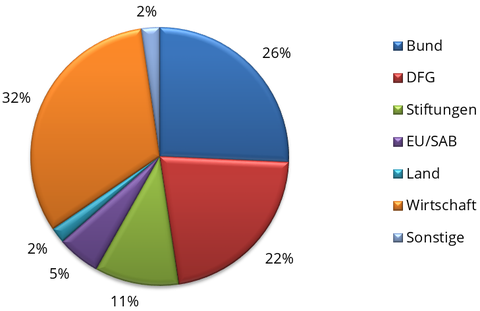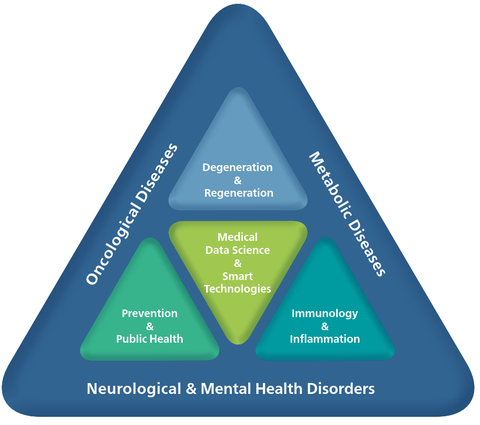Research Profile
Based on TU Dresden's research profile, which ranges from groundbreaking basic research to application-oriented projects with high transfer relevance, research at the Faculty of Medicine is embedded into the area of excellence “Principles of Life. Transforming Health Care”. The areas of excellence represent the currently strongest research fields of our University, which are characterized by publication impact and third-party funds.
The research profile of the Faculty of Medicine Dresden Carl Gustav Carus (MF-TUD) has developed from a broad spectrum of smaller research projects to three impressive research focuses.
These key areas are:
- Oncological Diseases - Our passion lies in exploring cancer diseases to discover innovative approaches in cancer therapy.
- Metabolic Diseases - We are committed to a better understanding and combating the impact of metabolic diseases, especially diabetes.
- Neurological & Mental Health Disorders - Research into neurological and psychological diseases is a cornerstone of our mission to promote the well-being of people.
In these key areas, Dresden University Medicine has developed exceptional performance in both research and patient care. We have achieved a critical mass that enables a seamless connection between basic research and clinical application.
The success of our strategic orientation, which is supported by both MF-TUD and Dresden University Hospital Carl Gustav Carus, is reflected in our collaboration with the German Centers for Health Research. We are proud to have successfully acquired sites of the German Consortium for Translational Cancer Research (DKTK) as well as the National Center for Tumor Diseases (NCT), the German Center for Diabetes Research (DZD), the German Center for Neurodegenerative Diseases (DZNE) and the German Center for Child and Adolescent Health (DZKJ).
Our three key areas are complemented by four highly interconnected clusters, highlighting our interdisciplinary approach and passion for pioneering research. Welcome to the exciting world of Dresden University Medicine, where research and innovation go hand in hand to promote the health and well-being of our society.
Some of our recent and most exciting large-scale research projects at MF-TUD (31.12.2024):
SaxoCell (living drugs) - A BMBF-funded cluster for future that aims to develop novel gene and cell therapeutics for a broader application of this complex form of therapy in various areas of medicine.
LiSyM (Liver Systems Medicine. Phase II - DEEP-HCC) - A BMFTR-funded collaborative project focusing on early-stage liver cancer with the aim of identifying novel blood and imaging biomarkers and potential targets for early detection and prevention.
SaxoCHILD (German Center for Child and Adolescent Health - start-up funding Leipzig/Dresden site) comprises BMFTR-funded structural measures aimed at improving the long-term healthy development of children and adolescents, with research priorities in obesity, metabolism, immunity, and psychosocial and mental health.
SFB/TRR 369 (DIONE - Degeneration of bone induced by inflammation) - A DFG-funded collaborative project with the aim of providing new insights into the mechanisms and therapeutic approaches to ameliorate inflammatory bone loss.
SFB/TRR 393 (Trajectories of Affective Disorders: Cognitive-emotional Mechanisms of Symptom Change) - A DFG-funded collaborative project with the goal to identify the triggers for new episodes, to determine cognitive-emotional mechanisms and neurobiological correlates of symptom changes, and to probe mechanism-based therapies.
Reinhart Koselleck-Projekt (Exploring long-term epigenetic silencing modules to advance the potential of therapeutic gene editing) - This DFG-funded research project aims to develop safe therapeutic interventions and improve targeted gene regulation in various pathological conditions.
RESOLVE (Residual disease assessment in hematologic malignancies to improve patient-relevant outcomes across Europe) - An EU-funded collaborative project that brings together experts and patient-representative partnerships to validate the predictive value of minimal residual disease in patients with acute myeloid or chronic lymphocytic leukemia and take a further step towards personalized precision medicine.
NADIR (New directions for deep learning in cancer research through concept explainability and virtual experimentation) - The aim of this ERC project is to develop new approaches to understanding tumors by combining clinical methods, artificial intelligence and deep learning in order to enable new therapeutic strategies.
GreenPharming (From biopharming to circular economy: climate-neutral active ingredient production) - This project, funded by the SMWK and the EU, aims to make pharmaceutical production more resource-efficient, sustainable and therefore more environmentally friendly. Biopharmaceutical active ingredients such as antibodies and cytokines are to be produced from renewable raw materials in a closed, climate-friendly system.
Key areas (As of: December 31, 2024):
- Apollo: Vergleich von Arsentrioxid (ATO) in Verbindung mit ATRA versus Standardtherapie (BMBF-Einzelprojekt)
- µBONE: Kolonisierung und Interaktion von Tumorzellen innerhalb des Knochenmilieus (DFG-SPP 2084)
- P²: Personalisierte Karriereentwicklung in der Präzisionsonkologie: P² (DKH)
- MelBrainSys: Modelbasierte Vorhersage und experimentelle Validierung neuer therapeutischer Interventionen für Melanom-Hirnmetastasen - In vitro Validierung essentieller Kandidaten und übergeordneter Signalwege verantwortlich für die Entstehung und Resistenzentwicklung von Melanom-Hirnmetastasen (BMFTR-Verbund)
- CIRCULATE: Klinische Studie zu einer auf zirkulierender Tumor-DNA basierenden Entscheidung über die adjuvante Chemotherapie beim Kolonkarzinom im Stadium II (BMFTR-Klinische Studie)
- LiSyM-Cancer: Liver Systems Medicine against Cancer. Phase II - Verbundprojekt: DEEP-HCC - Detaillierte Analyse der räumlichen Organisation der Entstehung des hepatozellulären Karzinoms (BMFTR-Verbund)
- SFB 1292 - Teilprojekt, Sprecherstandort Mainz: Gezielte Beeinflussung von konvergierenden Mechanismen ineffizienter Immunität bei Tumorerkrankungen und chronischen Infektionen (DFG-SFB)
- MI-EOCRC: Mikrobiota-basierte Prävention von Darmkrebs bei jungen Menschen (BMFTR-NDK)
- CAMINO: Karriereentwicklung für fortgeschrittene forschende ÄrztInnen in der multidimensionalen Tumorforschung (BMFTR-Einzelprojekt)
- HEROES-AYA: Heterogenität, Evolution und Resistenz von durch Fusionsgenen getriebenen Sarkomen bei Jugendlichen und jungen Erwachsenen (BMFTR-Verbund)
- COMPASS: deCOMPrimierendes stomA und zweizeitige elektive Resektion vs. Notfall-Resektion bei Patient:innen mit linksseitigem obstruktivem Kolonkarzinom (BMBF-Einzelprojekt)
- ONCOnnect: Dresden Medical Scientist Kolleg (EKFS)
- GENIAL: Understanding Gene ENvironment Interaction in ALcohol-related hepatocellular carcinoma (EU-Verbund)
- ODELIA: Open Consortium for Decentralized Medical Artificial Intelligence (EU-Verbund)
- UCC: Universitäts Krebszentrum UCC - Förderprogramm "Onkologische Spitzenzentren" (DKH-Verbund)
- RESOLVE: Residual disease assessment in hematologic malignancies to improve patient-relevant outcomes across Europe (EU-Verbund)
- ONco-Energetics_OFF: Dissection of Bioenergetic Plasticity of Tumors (EU-Einzelprojekt)
- UPGRADE: Unlocking Precision Gene Therapy (EU-Verbund)
- SFB/TRR 127 - 3 Teilprojekte, Sprecherstandort München: Biology of xenogeneic cell and organ transplantation - from bench to bedside (DFG-SFB)
- IRTG 2251 (ICSMD) - Immunologische und zellbasierte Strategien bei metabolischen Erkrankungen (DFG-GRK)
- SFB/TRR 205 – Standort-SFB: Die Nebenniere: Zentrales Relais in Gesundheit und Krankheit (DFG-SFB)
- GPPAD: Global Platform for the Prevention of Autoimmune Diabetes (GPPAD) (Helmsley Trust/Helmholz Zentrum München-Verbund)
- SFB 1371 – 2 Teilprojekte, Sprecherstandort München: Microbiome Signatures (DFG-SFB)
- FerrOs – Standort-Forschungsgruppe: Rolle des Eisenstoffwechsels in der osteopathischen Achse – FerrOs (DFG-Forschungsgruppe)
- LOSYSINCHRON: Local and systemic mechanisms for metabolic inflammation chronicity (EU-Einzelprojekt)
- SFB/TRR 940 – Standort-SFB: Volition and Cognitive Control: Mechanisms, Modulators and Dysfunctions" (DFG-SFB)
- SFB/TRR 265 – 8 Teilprojekte, Sprecherstandort Heidelberg/Mannheim: Losing and Regaining Control over Drug Intake (DFG-SFB)
- SFB/TRR 393: Verlaufsformen affektiver Störungen: Kognitiv-emotionale Mechanismen der Symptomänderung (DFG-SFB)
- IRTG 2773: Risks and Pathomechanisms of Affective Disorders (DFG-GRK)
- FOR 2790 – Teilprojekt, Sprecherstandort Trier: Merkmalsintegration und -abruf in der Handlungssteuerung (DFG-Forschungsgruppe)
- FOR 2698 - 7 Teilprojekte, Sprecherstandort Lübeck: Kognitive Theorie des Tourette Syndroms - ein neuer Ansatz (DFG-Forschungsgruppe)
Interconnected cluster (As of: December 31, 2024):
- Reinhart Koselleck-Projekt: Erforschung langfristiger epigenetischer Silencing-Module zur Weiterentwicklung des Potenzials einer therapeutischen Genbearbeitung (DFG-Einzelprojekt)
- EKFZ: Else Kröner Fresenius Center for Digital Health (EKFS-Verbund)
- CDS2USE: Nachwuchsgruppe CDS2USE – „Prospektiv-nutzergerechte Gestaltung klinischer Entscheidungsunterstützungssysteme im Kontext personalisierter Medizin“ (BMFTR-Einzelprojekt)
- NUM: Netzwerk Universitätsmedizin (BMFTR-Verbund)
- 6G-life: Digitale Transformation und Souveränität künftiger Kommunikationsnetze (BMFTR-Verbund)
- MiHUBx: Digitaler FortschrittsHub Gesundheit "Medical Informatics Hub in Saxony" (BMFTR-Verbund)
- SAXOCELL: Lebende Arzneimittel - Das sächsische Präzisionstherapie-Cluster (BMFTR-Verbund)
- PATH: Personal Mastery Health & Wellness Data (BMFTR-Verbund)
- ImplementDiGA: Erforschung des Implementierungsprozesses von Digitalen Gesundheitsanwendungen und deren Wirkungen in der Regelversorgung (BMG-Einzelprojekt)
- MEDGE – Teilprojekt, Standortprojekt: Secure Low-Power Medical Edge Computing (BMFTR-Verbund)
- SEMECO: Secure medical microsystems and communications (BMFTR-Verbund)
- CYMEDSEC: Enhanced cybersecurity for networked medical devices through optimisation of guidelines, standards, risk management and security by design (EU-Verbund)
- 3DP-SKINSPACE: Vorbereitungsvorhaben für die Herstellung von künstlicher Haut vermittels Bioprinting im Weltraum (BMWE-Verbund)
- IntelliLung: Artificial intelligence to help optimize ventilation for intensive care patients (EU-Verbund)
- NADIR: New directions for deep learning in cancer research through concept explainability and virtual experimentation (EU-Verbund)
- GreenPharming: From biopharming to circular economy: climate-neutral active ingredient production (sächs. Verbund)
- SFB/TRR 237 – 6 Teilprojekte, Sprecherstandort München: Nucleic Acid Immunity (DFG-SFB)
- SFB/TRR 319 (RMaP) – Teilprojekt, Sprecherstandort Mainz: RNA Modification and Processing (DFG-SFB)
- SFB/TRR 332 – Teilprojekt, Sprecherstandort Münster: Neutrophile Granulozyten: Entwicklung, Verhalten, und Funktion (DFG-SFB)
- SFB-TRR 369 (DIONE): Entzündungsbedingte Knochendegeneration (DFG-SFB)
- FOR 2599 – 3 Teilprojekte, Sprecherstandort: Heidelberg: Tissue type 2 responses: Mechanisms of induction and regulation (DFG-Forschungsgruppe)
- SaxoCHILD: Deutsches Zentrum für Kinder- und Jugendgesundheit Aufbauförderung - Aufbauförderung Standort Leipzig/Dresden (BMFTR-Verbund)
- FETONEONATPFAD: Fach und- sektorenübergreifender feto-neonataler Versorgungspfad für Risikoschwangere zur Verbesserung des kindlichen Outcome (BMG-Einzelprojekt)
- SaxoForn: Forschungspraxennetz Allgemeinmedizin Dresden/Frankfurt am Main (BMFTR-Verbund)
- SaxoCHILD: Deutsches Zentrum für Kinder- und Jugendgesundheit Aufbauförderung - Aufbauförderung Standort Leipzig/Dresden (BMFTR-Verbund)
- Value-basedTKR: Value-based Total-Knee-Replacement: Implementierung und weitere Evidenzbasierung von Indikationskritierien für Gelenkersatz bei GonarthroseImplementierung u. weitere Evidenzbasierung v. Indikationskriterien für Gelenkersatz (BMG-Einzelprojekt)
- SichereGeburt: VersorgungsNetz Sichere Geburt: strukturierte, versorgungsebenen-, disziplin- und fächerübergreifende Betreuung Schwangerer und Neugeborener (BMG-Einzelprojekt)
- Mo2Regio: Sektorenübergreifendes Monitoring und Modellierung der regionalen Gesundheitsversorgung (BMG-Verbund)
Third-party funding income of the Faculty of Medicine Carl Gustav Carus:

Distribution of third-party funding income among the funding institutions. Total volume of third-party funding acqisition 77 Mio. EUR. Period: 01.01. - 31.12.2024
Note: The Transparency Act requires institutions such as TU Dresden to disclose third-party funding providers. In order to avoid bureaucratic effort and at the same time ensure legal certainty with regard to transparency, disclosure is made on the TUD website.

